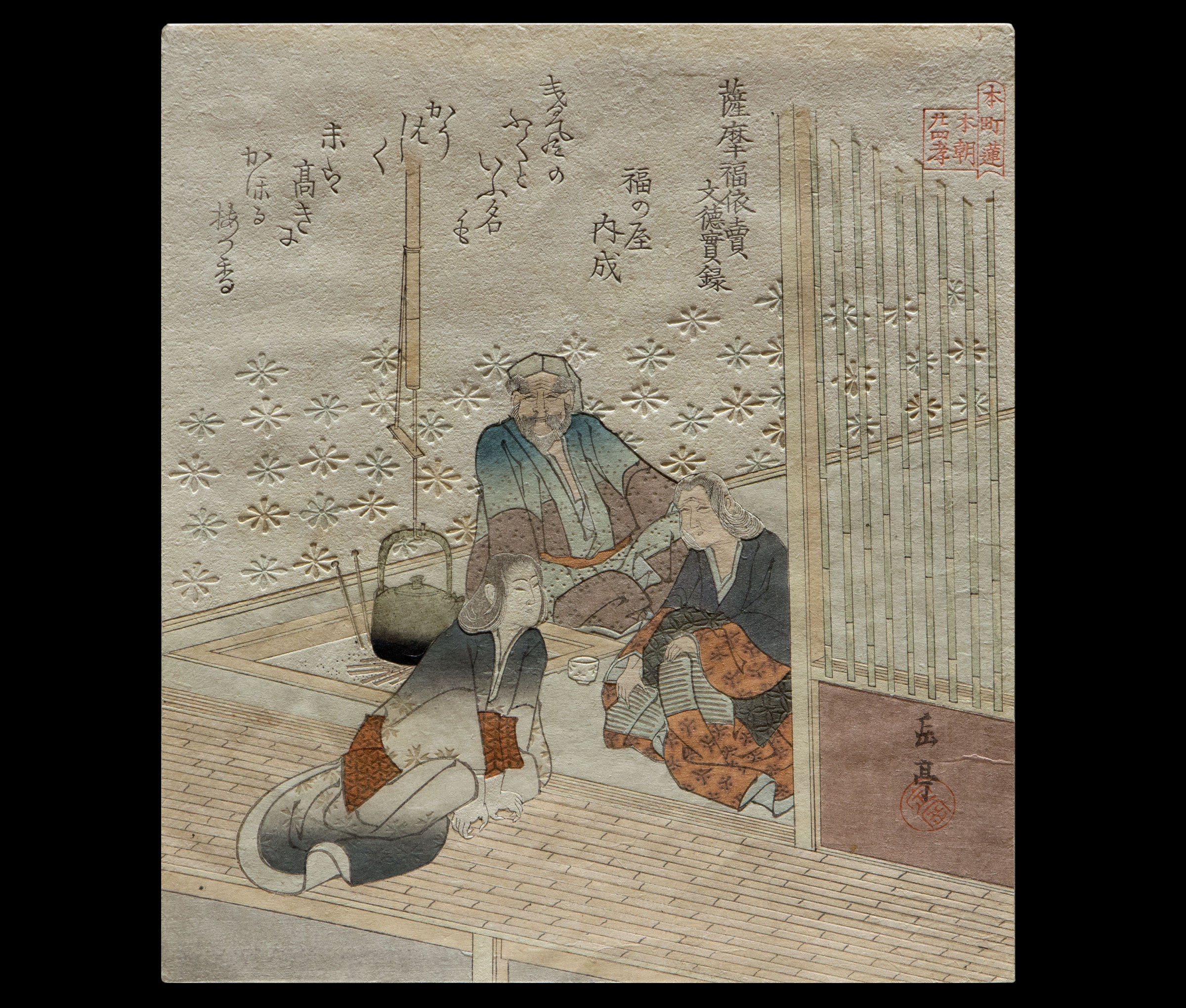Data
Description
Fukuyorime's parents didn't have any sons, and the three of them lived a poor life in Satsuma Province in Kyushu. Fukuyorime, who had perfect etiquette and deeply respected her parents, worked as a hired labourer for twenty years in order to support them, and is remembered in this beautiful surimono for her piety to them. In the image we see the parents and their daughter relaxing around the hearth at home. The lightly coloured flower pattern in the background and the bokashi gradation on the kimono are to be noted.
This is one print from the Motomachiren Honchō Nijūshikō (本町連 本朝廿四孝, "Twenty-Four Japanese Paragons of Filial Piety for the Honchō Poetry Circle") series of surimono prints by Gakutei (Motomachiren can also be read Honchōren).
The "Veritable Records of Emperor Montoku" mentioned in the title of the print refers to the Nihon Montoku Tennō Jitsuroku (日本文徳天皇実録, "The True History of Emperor Montoku of Japan"), a Japanese history text completed in 879 covering the years 850-858 (the years of reign of Emperor Montoku (827-858)). The poem in the print is by Fukunoya Uchinari (福の屋内成), a late Edo period poet.
Other prints in this set
-
 Akashi-ban Surimono
Akashi-ban Surimono
-
 Crow on Shrine Gate
Crow on Shrine Gate
-
 Insect with Loquat
Insect with Loquat
-
 Pair of Pheasants
Pair of Pheasants
-
 Pair of Fugu
Pair of Fugu
-
 Ebisu and Daikoku
Ebisu and Daikoku
-
 Satsuma no Fukuyorime
Satsuma no Fukuyorime
-
 Tea Grinding
Tea Grinding
-
 Tea Utensils
Tea Utensils
-
 River of Clouds
River of Clouds
-
 Stealing the Peaches of Immortality
Stealing the Peaches of Immortality
-
 Urashima Taro
Urashima Taro
-
 Saddlery
Saddlery
-
 Roof Tile with Sparrows
Roof Tile with Sparrows
-
 Dancers
Dancers
-
 Calendar print
Calendar print
-
 Pair of Fans
Pair of Fans
-
 Peonies
Peonies
-
 Tale of the Tongue-cut Sparrow
Tale of the Tongue-cut Sparrow
-
 Nine-tailed Fox
Nine-tailed Fox
-
 Still Life with Fishes
Still Life with Fishes
-
 Painting of a Peacock
Painting of a Peacock
-
 Ebisu
Ebisu
-
 Painting of the Courtesan Yugiri
Painting of the Courtesan Yugiri
-
 Lady Wei
Lady Wei
-
 Dancer
Dancer
-
 Hair Ornaments
Hair Ornaments
-
 Peach Blossoms and Seal
Peach Blossoms and Seal
-
 Birds over Waves
Birds over Waves
-
 Fruit Still Life
Fruit Still Life
-
 Sennin with Crane
Sennin with Crane
-
 Ono no Komachi
Ono no Komachi


